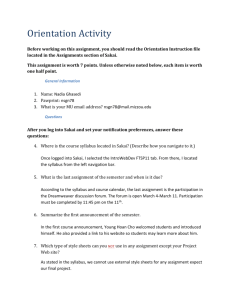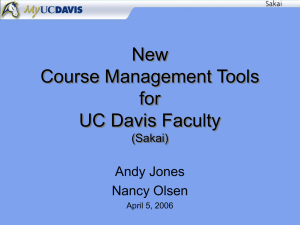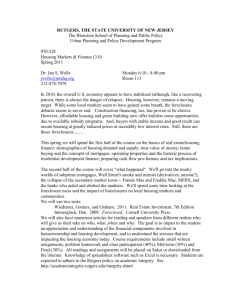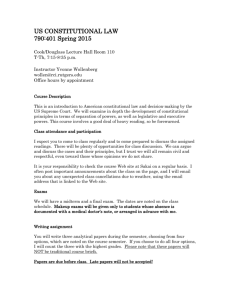310-SP13-Cander-20130111-122912
advertisement
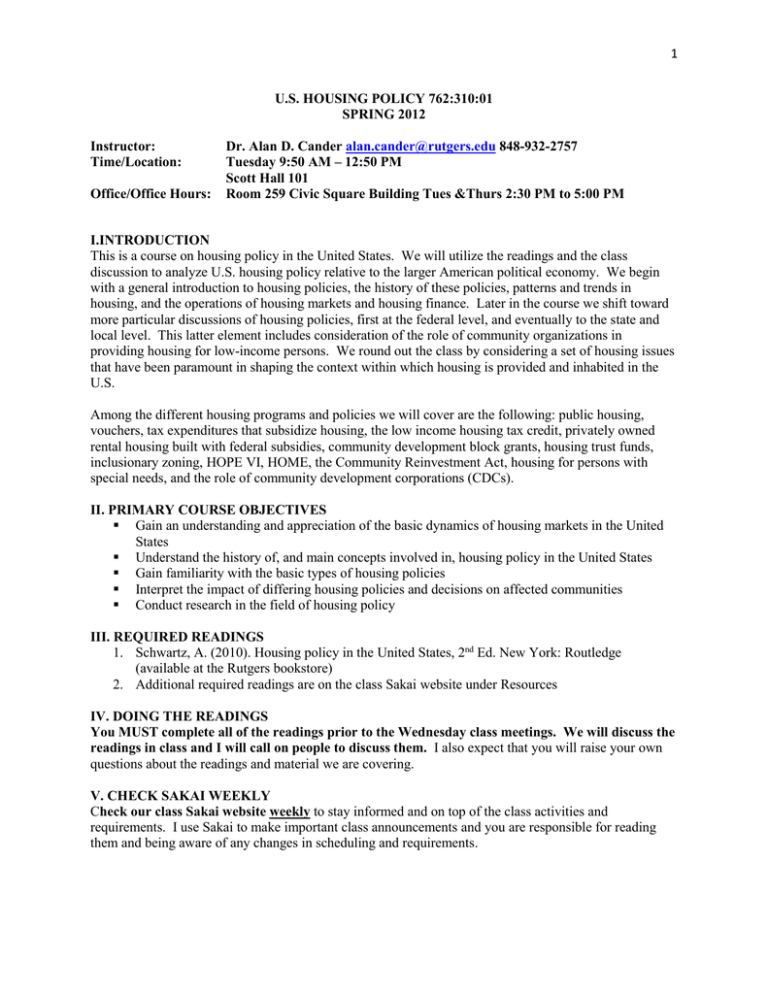
1 U.S. HOUSING POLICY 762:310:01 SPRING 2012 Instructor: Time/Location: Office/Office Hours: Dr. Alan D. Cander alan.cander@rutgers.edu 848-932-2757 Tuesday 9:50 AM – 12:50 PM Scott Hall 101 Room 259 Civic Square Building Tues &Thurs 2:30 PM to 5:00 PM I.INTRODUCTION This is a course on housing policy in the United States. We will utilize the readings and the class discussion to analyze U.S. housing policy relative to the larger American political economy. We begin with a general introduction to housing policies, the history of these policies, patterns and trends in housing, and the operations of housing markets and housing finance. Later in the course we shift toward more particular discussions of housing policies, first at the federal level, and eventually to the state and local level. This latter element includes consideration of the role of community organizations in providing housing for low-income persons. We round out the class by considering a set of housing issues that have been paramount in shaping the context within which housing is provided and inhabited in the U.S. Among the different housing programs and policies we will cover are the following: public housing, vouchers, tax expenditures that subsidize housing, the low income housing tax credit, privately owned rental housing built with federal subsidies, community development block grants, housing trust funds, inclusionary zoning, HOPE VI, HOME, the Community Reinvestment Act, housing for persons with special needs, and the role of community development corporations (CDCs). II. PRIMARY COURSE OBJECTIVES Gain an understanding and appreciation of the basic dynamics of housing markets in the United States Understand the history of, and main concepts involved in, housing policy in the United States Gain familiarity with the basic types of housing policies Interpret the impact of differing housing policies and decisions on affected communities Conduct research in the field of housing policy III. REQUIRED READINGS 1. Schwartz, A. (2010). Housing policy in the United States, 2nd Ed. New York: Routledge (available at the Rutgers bookstore) 2. Additional required readings are on the class Sakai website under Resources IV. DOING THE READINGS You MUST complete all of the readings prior to the Wednesday class meetings. We will discuss the readings in class and I will call on people to discuss them. I also expect that you will raise your own questions about the readings and material we are covering. V. CHECK SAKAI WEEKLY Check our class Sakai website weekly to stay informed and on top of the class activities and requirements. I use Sakai to make important class announcements and you are responsible for reading them and being aware of any changes in scheduling and requirements. 2 VI. CORE COURSE REQUIREMENTS Basis for Your Final Grade 10% = 1 Reaction Paper Based on Class Readings (Each paper is worth 10% of your grade) 20% = Mid-term Exam 20% = Final Exam (Take Home) 30% = Group Policy Report 10% = Group Presentation on Policy Report 10% = Class Attendance and Active Participation The Reaction Paper Each student is required to prepare a 5-page reaction paper to one week’s worth of the course’s weekly required readings. You may choose any single week’s readings between January 29th and April 9th for writing your paper. The reaction paper for the February 12th class, for example, must be submitted onto the class Sakai website by 9:00 AM on February 12th. This paper accounts for 10% of your final grade and will be graded on a 100-point scale. The reaction paper must be typed doublespaced in 12 point font. I do not want mere summaries of the reading. Instead, I want you to draw out the implications of the readings for our understanding of housing and housing policies in the United States. Reaction papers cannot be submitted late. Mid-Term Examination The mid-term will contain both short answer and essay questions and will be held in class. The mid-term accounts for 20% of your grade. The exam is scheduled for March 12th. Final Exam The final exam will consist of a take-home essay exam that you will receive in class on April 30th. You will submit your written answer to the final on our class Sakai site by May 9th at 12:00 noon. Your essay is not to exceed 5 pages, double-spaced. The final exam accounts for 20% of your grade. Group Policy Report In groups of 3 to 5 students, you will all write a “policy report” about a housing policy or program of your choice. The report must contain the following components: 1. Executive summary [1 to 3 pages] 2. The actual report [18 to 20 pages], containing the following: a. Background/history of the policy or program b. Current status of the policy or program c. Any pending political or legislative initiatives regarding the policy or program d. Problems with the policy or program e. Recommendations 3. References Important: Each student must write one section of the Group Policy Report. The Group Policy Report must clearly indicate which section each student wrote. Each Group Policy Report will contain 6 larger sections based on the above outline. Although each student must write a section, one or more of the sections can be written by more than one student. Each student, however, will receive an individual grade based on the section(s) of the Report he, or she, writes. There are no “group” grades for the Report. That stated, each group should coordinate the writing to provide clarity and logical flow throughout the Report. 3 On March 5th, each group must hand in a brief (1 page) description of their report and an outline (1-2 pages) of their report. The Group Report from each group is due April 30th, submitted onto the class Sakai website by 9:00 AM, and each group must also bring a single, complete hard copy of the entire report to class on April 30th. The section(s) of the Group Report you write accounts for 30% of your grade. Group Presentations of Group Policy Report Each group will orally present a synopsis of the components of their Group Policy Report that should more or less follow the outline of the Report and recommendations. Each student will receive an individual grade for their portion of the presentation. There are no “group” presentation grades. That stated, the members of each group should coordinate the presentation and practice together to create a clear, logical flow. Your component of the Group Presentation accounts for 10% of your grade. Class Participation and Attendance Class participation is a major requirement in this class and I expect your participation to be active. Active participation means more than simply attending class. It means raising your hand to respond to the class discussions about the readings, providing your reasoned opinion, and/or posing questions about material that you found difficult or unclear or that further piqued your curiosity. Certainly, I do not expect you to have “the singular brilliant answer” [there really is no such thing in the social sciences] when you participate in class but I do want to know what you think, what you did and did not understand from the reading materials, what you thought made sense, what you thought were not good arguments, and how you related the readings to your own academic and non-academic knowledge and experiences. Although I will be lecturing I will also be working hard to establish a dialogue with all of you because that enhances the learning environment. If I find that you are sitting back and not actively participating I will call on you. Again, I have found that students benefit more from the learning experience by becoming actively engaged in class discussions. It is also a great way to build up your confidence about speaking in front of others. It is your responsibility to attend class. I will take attendance during each class and I quickly get to know names and faces. The only legitimate absences are illness or actual family emergencies or deaths. If you are legitimately sick or expect to miss a class, please use the Rutgers University absence reporting website, which is located online at https://sims.rutgers.edu/ssra/ to indicate that you will be absent. Unexcused absences will lower your class participation/attendance grade. Thus, it is vitally important to do all the readings, come to class, and actively participate! Class participation/attendance accounts for 10% of your grade. VII. GRADING SCALE A is 90 – 100 B+ is 87 - 89 C is 70 - 76 D is 60 - 69 B is 80 – 86 F is 59 and lower C+ is 77 - 79 4 VIII. ACADEMIC INTEGRITY Plagiarism from other sources or from each other’s work in any manner is not tolerated and will result in a grade of 0 (zero) for that assignment. As well, taking whole chunks from your own previously written papers from other classes and plopping them into any of the written assignments for this class will not be tolerated and will result in a 0 (zero) grade for the assignment. Similarly, you may not turn in a previously or concurrently written paper from another class as a “substitute” for the paper assigned for this class. Doing so will also result in a 0 (zero) grade for the assignment. I use software (Turn It In) on Sakai that will reveal any and all forms of plagiarism. Please consult the updated Academic Integrity document on the web: http://academicintegrity.rutgers.edu/integrity.shtml#l IX. CLASSROOM BEHAVIOR AND MANNERS I expect you to respect the views, comments, and experiences of your fellow classmates and will not tolerate disrespectful, intimidating, or insulting behavior. People have political and ideological differences. Respect those differences; we can all learn from each other. Disruptive behavior during class time is not permitted. This includes holding side conversations, listening to and/or singing along with your IPOD, working on your laptop or other computerized equipment even if it is academically related, reading non-related course materials, playing videos, playing cards, texting, twittering, reading emails, surfing the Internet, and so forth. Such behaviors and activities are distracting to the other students and the instructor and, therefore, disruptive and will not be tolerated. All cell phones, IPODS, and related electronic equipment must be silenced or turned off during class time. Disruptive students will be asked to leave and that will mean an unexcused absence for them. X. READINGS AND ASSIGNMENTS *Readings located on the class Sakai site under Resources are indicated in parentheses Jan 22 Jan 29 Feb 5 Feb 12 Feb 19 Feb 26 Mar 5 Mar 12 Introduction to the Class Part I: Overview, Housing Markets, and Housing Finance Topic: General Housing Policies Schwartz: Chapter 1 Dreier, P: Federal Housing Subsidies: Who Benefits and Why?” (DREIER on Sakai) Topic: Housing and Housing Markets in the United States Schwartz, Chapter 2 Topic: Housing Finance Schwartz: Chapter 3 Immergluck, D.: The Foreclosure Crisis, Foreclosed Properties, and Federal Policy (IMMERGLUCK on Sakai) Apgar, W., Bendimerad, A., and R. Essene: Mortgage Market Channels and Fair Lending: An Analysis of HMDA Data (APGAR on Sakai) Part II: Federal Housing Policies Topics: Tax Subsidies and Low Income Housing Tax Credits Schwartz: Chapters 4 and 5 Topics: Public Housing and HOPE VI Schwartz: Chapter 6 Popkin, Susan et al: A Decade of HOPE VI (POPKIN on Sakai) Topics: Section 8 Projects and Vouchers Schwartz: Chapters 7 and 8 DeFillipis, J. and E. Wyly: Running to Stand Still: Through the Looking Glass With Federally-Subsidized Housing in New York City (DEFILIPPIS on Sakai) Brief Description/Outline of Group Policy Reports Due from Each Group*** Mid-Term Examination 5 Mar 26 Apr 2 Apr 9 Apr 16 Apr 23 Apr 30 May 9 Part III: State, Local, and Community Roles in Housing Policy Topics: Overview, Zoning, Land Use, and Eminent Domain Schwartz Chapter 9, first half Ihlanfeldt, K.: Exclusionary Land-Use Regulations within Suburban Communities a Review of the Evidence and Policy Prescriptions (IHLANFELDT on Sakai) Payne, J.: The Paradox of Progress: Three Decades of the Mount Laurel Decision (PAYNE on Sakai) Topic: Community Development and Housing Policy Schwartz Chapter 9, second half Swanstrom, T.: The Nonprofitization of United States Housing Policy: Dilemmas of Community Development (SWANSTROM on Sakai) Bratt, R. and B. Rohe: Challenges and Dilemmas Facing Community Development Corporations in the United States (BRATT AND ROHE on Sakai) Part IV: Issues in Housing Policy Topic: Race, Discrimination and Segregation Schwartz: Chapter 11 Denton, N.: Half Empty or Half Full: Segregation and Segregated Neighborhoods 30 Years After the Fair Housing Act (DENTON on Sakai) ****Last week to turn in your 5-page reaction paper****. Topic: Poverty Concentration, De-concentration, and Mixed Income Housing Goetz, E. : Housing Dispersal Programs (GOETZ on Sakai) Joseph, M. et al: The Theoretical Basis for Addressing Poverty through MixedIncome Development (JOSEPH on Sakai) Jargowsky, P. and R. Yang: The ‘Underclass’ Revisited: A Social Problem in Decline (JARGOWSKY on Sakai) Topic: Housing Tenure Galster, G. and A. Santiago: Low Income Homeownership as an Asset-Building Tool: What Can We Tell Policymakers? (GALSTER on Sakai) ***All Group Policy Reports are Due uploaded/submitted onto the class Sakai website by 9:00 AM and each group must bring a complete hard copy of their report to class. *** Group Presentations Take Home Final Passed Out in Class Take Home Final due uploaded/submitted onto class Sakai website by 12:00 Noon



